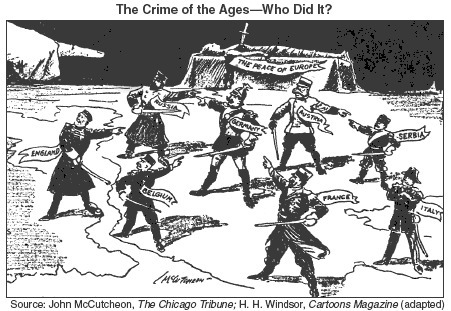 |
| Political cartoon showing the causes of World War I |
- On June 28, 1914, Archduke Franz Ferdinand, heir to the throne of Austria-Hungary, was killed in Sarajevo, Bosnia by a Serbian nationalist.
- One month later, on July 28, Austria-Hungary declared war on Serbia.
- On July 29, Russia, who considered itself the protector and leader of all the Slavic people, and an ally of Serbia, declared war on Austria-Hungary .
- On August 1, 1914, Germany, allied with Austria-Hungary, declares war on Russia.
- Great Britain, allied with Russia, begins a blockade of Germany.
- France, also allied with Russia, refused to remain neutral, and begins to mobilize its army.
- On August 4:
- Germany invades Belgium, a neutral county, in order knock France out of the war, according to their military strategy.
- Great Britain, allied with France, declares war on Germany
- On August 10, Austria invaded Russian Poland.
- On August 15, Russia invaded East Prussia (a part off Germany)
- On August 18, Russia invaded Galicia (ruled by Austria-Hungary), and quickly took control of the entire area.
- August 26-30, Germany defeated Russia in the Battle of Tannenburg.
- September 7-14, Germany defeated Russia in the Battle of the Masurian Lakes.
 |
(Austria-Hungary, Germany and The Ottoman Empire), and the Triple Entente
(Great Britain, France and Russia), made war inevitable. However, nobody thought that this war would last very long, most people assumed that it would be over by Christmas. It lasted four years, and destroyed the Empires of Russia, Germany, and the Ottomans), created new countries in Europe and the Middle East, and paved the way for revolution in Russia. U.S. President Wilson called it "The war to end all wars", yet it was followed by World War II twenty years later.
The human toll was catastrophic. Millions died. My family, living near the border of the Austria-Hungarian Empire and Russia, lived in a battle zone, as the area changed hands seven times in six years. Three of my uncles were drafted into the Austrian Army, and other relatives were killed.
My great grandmother, Marya Bryniak Rychly and her children lived in Bila, just outside Ternopil, near the border with Russia. Her husband, Sylvester and two of her daughters were in Minneapolis, Minnesota. She had six children living with her in a one room house. Although she had the support of her extended family and financial support from her husband, she was a single mother.
Katherine, her daughter told about the effects of the war on her family:
"WWI broke out on August 18, 1914. Black day! No more school. No more happy days."
The 8th Russian Army, commanded by General Brusilov, invaded Galicia on September 18, and by September 3, controlled all of Eastern Galicia. They would control it until June, 1915. The object of this invasion was to recapture Galicia, which the Russians considered part of their country and restore it to the Russian Empire.
For the next year, there were five Russian soldiers living with the Rychly family, and all the other families in the village. Ten people in a small, one room house.
Katherine recounted:
"There would be four or five of them living in our house at all times, as well as in all the homes of our village, The soldiers would come to rest and change their clothes, which I doubt very much that they did--they didn't have anything to change into. Their clothes were filthy, filled with lice, encrusted with the elements of living on the battlefield."She continued"
"One day during the early days of WWI, a Russian soldier came to visit one of his friends that lived in our house with us. According to the custom,, he made deep reverences as he stood in the doorway, blessing himself and bowing three times. When he straightened up after the third reverence, his head touched the overhead ledge--and it came falling to the ground, with all the precious bowls that were on it--breaking all of them. My mother was sick about the loss--but there was nothing she could do. The precious keepsakes were gone forever."As the war continued the Rychly family lost more than their crockery and their privacy.
 |
| Map showing the first battles on the Eastern Front. Ternopil' (Tarnopol) is on the lower right side of the map. |
Source:
Lawryk, Julia, Kateryna (Kaska): Autobiiography by Katherine Pylatiuk Lymar as told to
her daughter, Julie in 1988.
No comments:
Post a Comment